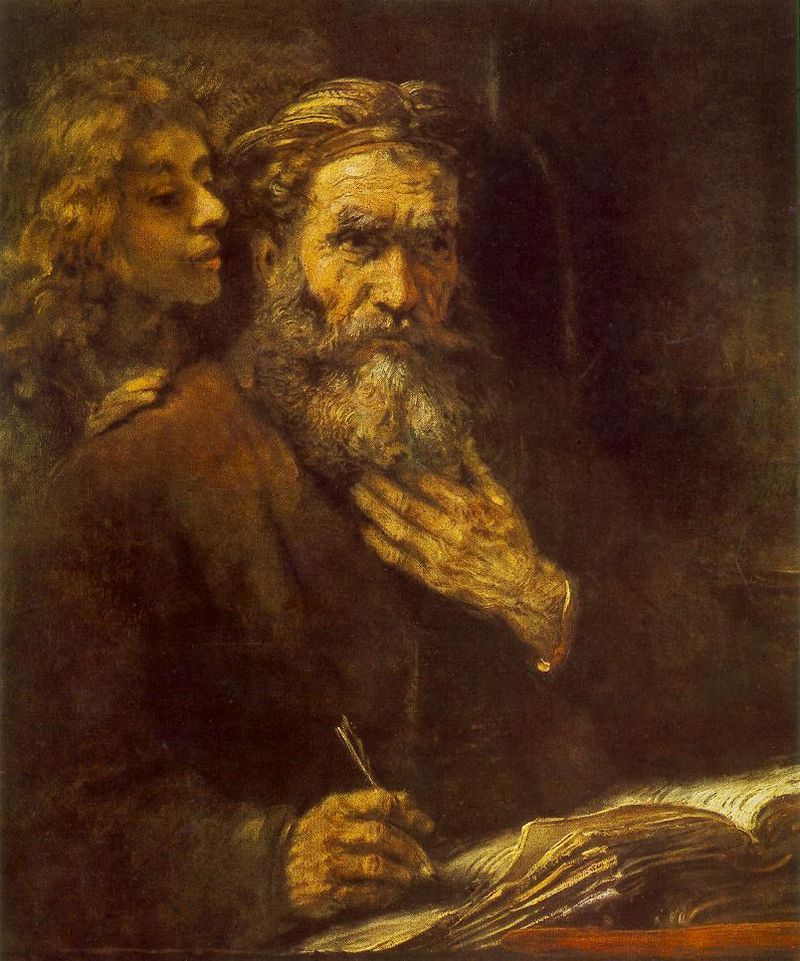|
Matthew, later Saint Matthew, is another of the Galilean disciples. Traditionally, he is also the author of the Gospel of Matthew, one of the four evangelists. Of all the disciples, he is one of the least likely candidates to have been chosen by Jesus since he was “Matthew the tax collector” (Matthew 10:30) and not liked by the public.
Tax collectors or publicans, as they were also called, collected unpaid taxes for the Roman occupiers. It was not their job that caused people to dislike them but rather their fraudulent behaviour. Rather than collecting the amount that was owed, the tax collectors demanded more money, keeping the excess for themselves. Tax collectors were seen as both greedy and collaborators with the Romans. “As Jesus went on from there, he saw a man named Matthew sitting at the tax collector’s booth. “Follow me,” he told him, and Matthew got up and followed him.” (Matthew 9:9) Jesus came across Matthew after healing a paralysed man in Capernaum. Matthew invited Jesus to his house for a meal, an invitation that did not go unnoticed by the Pharisees. Always trying to find fault with Jesus, the Pharisees asked the disciples “Why does your teacher eat with tax collectors and sinners?” (9:11) Before they could respond, Jesus answered them, explaining, “It is not the healthy who need a doctor, but the sick. But go and learn what this means: ‘I desire mercy, not sacrifice.’For I have not come to call the righteous, but sinners.” (9:12-13) Nothing is known of Matthew’s early life other than his career, although in one Bible verse the name of his father is mentioned. “And as he passed by, he saw Levi the son of Alphaeus sitting at the receipt of custom, and said unto him, Follow me. And he arose and followed him.” (Mark 2:14) As you will notice, Matthew was also known by the name Levi and his father was Alphaeus. The Bible also records the father of the Apostle James (see my next article) as Alphaeus but there is no evidence they are the same person. A man of the same name is also implied to be the father of Joseph/Joses, a potential brother of Jesus. In the Catholic Church, Saints Abercius and Helena also have a father called Alphaeus. Matthew’s call to discipleship is recorded in the gospels of Matthew, Mark and Luke, however, he is never mentioned in John. The final mention of the disciple is in Acts 1:10–14 where the apostles had withdrawn to a room after the Ascension of Jesus. To begin with, the disciples remained in the Jewish communities in Judea, preaching the Gospel before moving to other countries. Unfortunately, scholars have not been able to determine to which countries Matthew travelled. It is traditionally believed he died a martyr but there is no evidence of this. Writers have suggested Hierapolis in Greece or Ethiopia as Matthew’s place of death. The early Christian bishop Papias of Hierapolis (c. AD 60–163) was the first person to propose Matthew the Apostle and Matthew the Evangelist were the same. The Gospel was written in Hebrew near Jerusalem for Hebrew Christians before being translated into Greek. As a tax collector, Matthew would have been literate in Aramaic and Greek as well as his native tongue. To begin with, Matthew’s Gospel was known as Gospel according to the Hebrews and Gospel of the Apostles. An argument against Matthew’s authorship points out the text was written anonymously and at no point does the author imply he was an eyewitness to the events. Matthew is supposedly buried in the crypt of Salerno Cathedral in southern Italy. He is recognised as a saint in Catholic, Orthodox, Lutheran and Anglican churches, and his feast day is celebrated on 21st September. In art, Matthew is usually shown with a book, implying he wrote the Gospel, and an angel. Just for fun and to end this article, here is a short list of the things that have Matthew as their patron:
1 Comment
12/30/2020 12:58:01 am
Even though the disciple Matthew was not liked by many people, Jesus still chose to see the good side of him. As you may or may not know, Matthew was a tax collector. Back then, tax collectors were considered as enemies of the people. This is due to the fact that most tax collectors abused their power. Whenever they have to collect taxes from the people, they always demanded for more money, which left the people struggling to make ends meet.
Reply
Your comment will be posted after it is approved.
Leave a Reply. |
©Copyright
We are happy for you to use any material found here, however, please acknowledge the source: www.gantshillurc.co.uk AuthorRev'd Martin Wheadon Archives
June 2024
Categories
All
|

 RSS Feed
RSS Feed